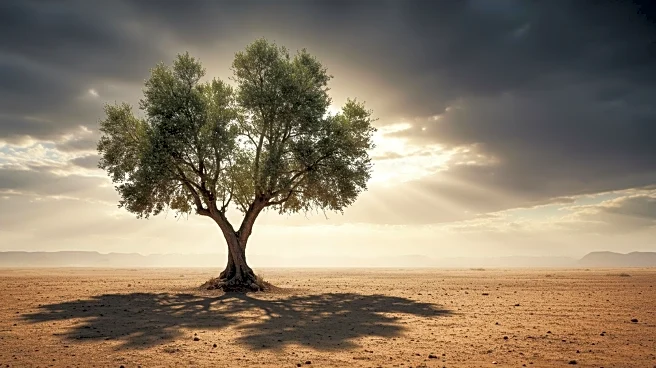What's Happening?
Zakaria Zubeidi, a former Palestinian militant and prominent figure during the Second Intifada, has expressed doubts about the effectiveness of Palestinian resistance efforts for statehood. Released from Israeli prison in January as part of a hostage-prisoner exchange, Zubeidi has since been involved in cultural initiatives, such as the Freedom Theater in Jenin, aimed at promoting artistic expression among Palestinian youth. Despite these efforts, Zubeidi remains skeptical about the potential for both armed and cultural resistance to achieve meaningful progress. He highlighted the lack of a peaceful or military solution, attributing the stalemate to Israel's unwillingness to concede to Palestinian demands. Zubeidi's comments come amid ongoing tensions in the West Bank, particularly in Jenin, where clashes between Israeli forces and Palestinians have resulted in casualties.
Why It's Important?
Zubeidi's reflections underscore the persistent challenges facing the Palestinian resistance movement and the broader Israeli-Palestinian conflict. His transition from armed struggle to cultural advocacy reflects a broader debate within Palestinian society about the most effective means of pursuing statehood. The ongoing violence in areas like Jenin highlights the volatility of the region and the human cost of the conflict. Zubeidi's experiences and statements may influence public opinion and policy discussions regarding the future of Palestinian resistance and the potential for peace. The international community continues to monitor these developments, as they have significant implications for regional stability and diplomatic relations.
What's Next?
The future of Palestinian resistance remains uncertain, with potential shifts in strategy depending on internal and external pressures. Zubeidi's call for a reassessment of resistance methods may prompt discussions among Palestinian leaders and activists about alternative approaches. Meanwhile, the Israeli government's response to ongoing tensions and international diplomatic efforts could shape the trajectory of the conflict. Observers will be watching for any changes in policy or strategy from both sides that could impact the prospects for peace or further escalation.
Beyond the Headlines
Zubeidi's story highlights the complex interplay between personal transformation and broader political struggles. His journey from militant to cultural advocate raises questions about the role of identity and personal agency in conflict resolution. Additionally, his experiences with the Israeli prison system and subsequent release illustrate the human rights dimensions of the conflict, including issues of detention and treatment of prisoners. These aspects contribute to the ongoing discourse on justice and reconciliation in the region.











